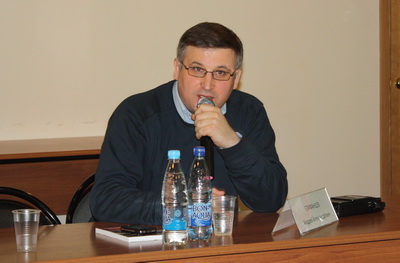
Circassian Activist Warns Russia Will Lose Allies If It Does Not Help Syrian Circassians
Publication: Eurasia Daily Monitor Volume: 10 Issue: 136
By:

On July 17, a frequent writer on Circassian topics, Andrei Yepifantsev, attacked Circassian activists for “nationalism” and pushing for help to the Syrian Circassians caught in the civil war in that Middle Eastern country. “Three primary themes of the Circassian nationalist movement are recognition of the genocide, resettlement of the diaspora to the Caucasus and establishment of a unified Circassian republic on the lands of historical Circassia,” the author wrote, summing up the Circassian movement’s goals. Yepifantsev accused the Circassian activists of trying to use the plight of the Syrian Circassians to further a narrow “nationalist” agenda. There are many other ways to help the Syrian Circassians apart from bringing them to the “problematic North Caucasus,” the Russian analyst wrote. “It is possible to work alongside the Russian government to create special peace, non-combat zones inside Syria itself and resettle the Circassians there. Another possibility is to take them not to Russia, but to other countries.” Ironically, in his article, Yepifantsev attacked perhaps one of the most Moscow-friendly Circassian activists, Asker Sokht from the Krasnodar region, accusing him of insisting that the Syrian Circassians be allowed to return to their ancestral lands in the North Caucasus (https://www.bigcaucasus.com/events/world/17-07-2013/84688-circassian_caucasus-0/).
Circassian activists managed to help about 1,000 Circassians from Syria resettle in the North Caucasus, primarily in Kabardino-Balkaria and Adygea. The Russian government’s vague promises to help Syrian Circassians who need assistance with resettlement went unfulfilled, and the Circassians were left on their own to deal with the problem. Thousands of Syrian Circassians reportedly fled to the countries in Syria’s immediate neighborhood, such as Turkey and Jordan. Circassian activists claim that Syrian Circassians are eligible under the existing Russian legislation to resettle in the Russian Federation as Russian compatriots. While, formally, Circassians from Syria may actually be covered by the law, ethnic non-Russians are apparently less favored by the Russian state as potential settlers in the country, despite its vast territory and declining population. At the same time, Moscow tries not to offend the Circassian activists directly because next year’s Winter Olympics in Sochi, which will be held in historically Circassian territory, are attracting substantial international attention.
In his article, Yepifantsev remarked that the civil war in Syria and the Olympics in Sochi are playing into the hands of the Circassian activists. While advocating against the resettlement of Syrian Circassians in the North Caucasus, Yepifantsev at the same time tried to reassure the public that there are only a handful Syrian Circassians who would permanently resettle in the Russian North Caucasus (https://www.bigcaucasus.com/events/world/17-07-2013/84688-circassian_caucasus-0/). Yepifantsev’s internally contradictory, dismissive and alarmist assertions beg the question of why the Russian government is so reluctant to allow Circassian refugees in, if their numbers are so low.
Asker Sokht provided his own response to Yepifantsev in an interview with the Adyge Heku website. His primary counterargument was that by ignoring the plight of the Syrian Circassians, Russia is alienating the large Circassian population in the Middle East and losing an important ally in that vital region. “The Syrian crisis is not some kind of historical boundary that completes the political and historical process in a region extremely important to the national interests of the Russian Federation,” and Moscow will need allies in the region in the future, Sokht asserted.
The Circassian activist emphasized that Circassian organizations in Russia cannot force other countries to accept Circassian refugees from Syria, so Yepifantsev’s claims to the contrary are misplaced. He described the fate of other Circassian settlers—those from Kosovo who were resettled in Adygea by the Russian government in 1998–1999. Kosovo, which was part of the Ottoman Empire, had a small population of Circassians who were resettled in Adygea as the conflict between the Serbian government and the Kosovar movement intensified in the 1990s. Overall, 50 Circassian families, totaling 190 people, returned to Adygea in 1998–1999, according to Sokht, and only six of the families, who were of mixed Circassian-Albanian origin, returned to Kosovo once the situation stabilized in that country (https://aheku.org/page-id-3604.html).
Meanwhile, on July 14, the Coordinating Council of Circassian organizations in the Russian Federation declared that a joint conference will be held in Istanbul in October 2013. The Coordinating Council includes Circassian organizations from Adygea, Kabardino-Balkaria, Karachaevo-Cherkessia, Krasnodar and Stavropol regions, Moscow and St. Petersburg. The conference in Istanbul is expected to gather Circassians from all over the world to discuss the future of the Circassian nation, and especially the Syrian Circassians (https://aheku.org/page-id-3602.html). It is worth noting that Circassian activists from Russia have called for a conference to be held not in Russia, but in Turkey. This is not coincidental. Apart from the fact that Turkey has the largest Circassian population in the world, it is also much more open to foreign visitors than Russia, especially the Russian North Caucasus.
In the run-up to the Olympics in Sochi in 2014, the Russian government is likely to adopt even more stringent rules for visiting the North Caucasus, in stark contrast to the openness that the spirit of the Olympiad should bring. The Russian government’s disregard for the interests of the Circassians is likely to spark increasing protests by Circassian activists. Indeed, the Olympic Games in Sochi present a unique opportunity for Circassian activists to advance their goals, and they are likely to take advantage of this opportunity to deliver their message to the world community.




